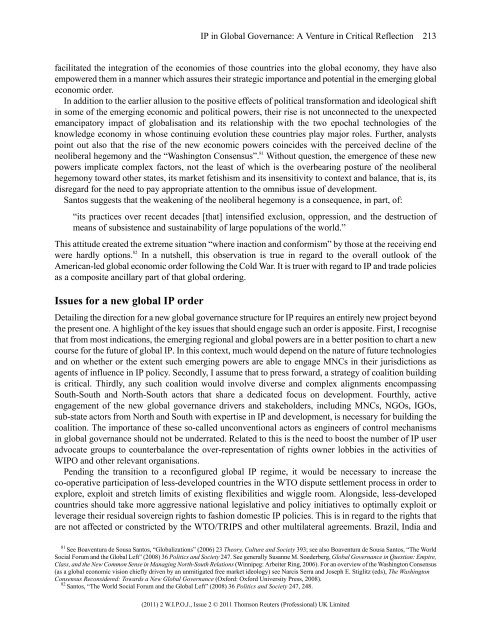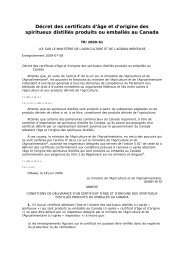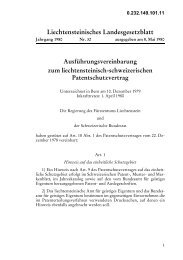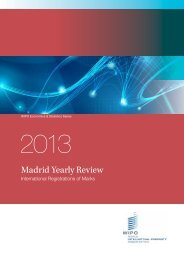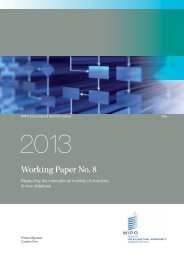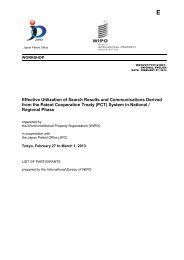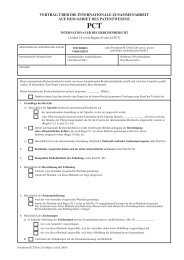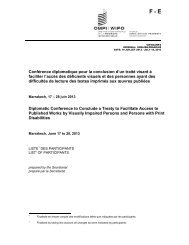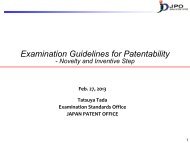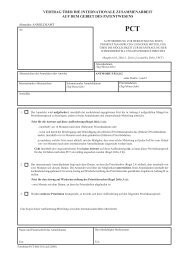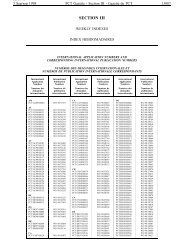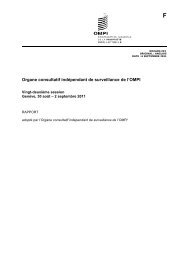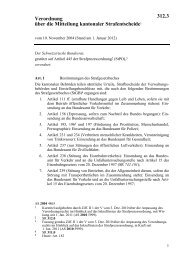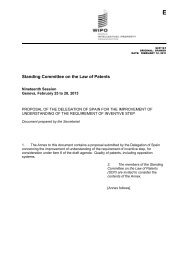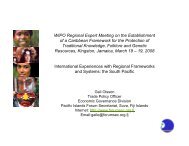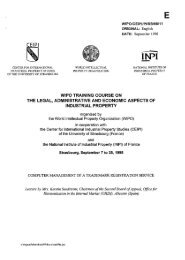WIPO Journal - World Intellectual Property Organization
WIPO Journal - World Intellectual Property Organization
WIPO Journal - World Intellectual Property Organization
Create successful ePaper yourself
Turn your PDF publications into a flip-book with our unique Google optimized e-Paper software.
facilitated the integration of the economies of those countries into the global economy, they have also<br />
empowered them in a manner which assures their strategic importance and potential in the emerging global<br />
economic order.<br />
In addition to the earlier allusion to the positive effects of political transformation and ideological shift<br />
in some of the emerging economic and political powers, their rise is not unconnected to the unexpected<br />
emancipatory impact of globalisation and its relationship with the two epochal technologies of the<br />
knowledge economy in whose continuing evolution these countries play major roles. Further, analysts<br />
point out also that the rise of the new economic powers coincides with the perceived decline of the<br />
neoliberal hegemony and the “Washington Consensus”. 81 Without question, the emergence of these new<br />
powers implicate complex factors, not the least of which is the overbearing posture of the neoliberal<br />
hegemony toward other states, its market fetishism and its insensitivity to context and balance, that is, its<br />
disregard for the need to pay appropriate attention to the omnibus issue of development.<br />
Santos suggests that the weakening of the neoliberal hegemony is a consequence, in part, of:<br />
“its practices over recent decades [that] intensified exclusion, oppression, and the destruction of<br />
means of subsistence and sustainability of large populations of the world.”<br />
This attitude created the extreme situation “where inaction and conformism” by those at the receiving end<br />
were hardly options. 82 In a nutshell, this observation is true in regard to the overall outlook of the<br />
American-led global economic order following the Cold War. It is truer with regard to IP and trade policies<br />
as a composite ancillary part of that global ordering.<br />
Issues for a new global IP order<br />
IP in Global Governance: A Venture in Critical Reflection 213<br />
Detailing the direction for a new global governance structure for IP requires an entirely new project beyond<br />
the present one. A highlight of the key issues that should engage such an order is apposite. First, I recognise<br />
that from most indications, the emerging regional and global powers are in a better position to chart a new<br />
course for the future of global IP. In this context, much would depend on the nature of future technologies<br />
and on whether or the extent such emerging powers are able to engage MNCs in their jurisdictions as<br />
agents of influence in IP policy. Secondly, I assume that to press forward, a strategy of coalition building<br />
is critical. Thirdly, any such coalition would involve diverse and complex alignments encompassing<br />
South-South and North-South actors that share a dedicated focus on development. Fourthly, active<br />
engagement of the new global governance drivers and stakeholders, including MNCs, NGOs, IGOs,<br />
sub-state actors from North and South with expertise in IP and development, is necessary for building the<br />
coalition. The importance of these so-called unconventional actors as engineers of control mechanisms<br />
in global governance should not be underrated. Related to this is the need to boost the number of IP user<br />
advocate groups to counterbalance the over-representation of rights owner lobbies in the activities of<br />
<strong>WIPO</strong> and other relevant organisations.<br />
Pending the transition to a reconfigured global IP regime, it would be necessary to increase the<br />
co-operative participation of less-developed countries in the WTO dispute settlement process in order to<br />
explore, exploit and stretch limits of existing flexibilities and wiggle room. Alongside, less-developed<br />
countries should take more aggressive national legislative and policy initiatives to optimally exploit or<br />
leverage their residual sovereign rights to fashion domestic IP policies. This is in regard to the rights that<br />
are not affected or constricted by the WTO/TRIPS and other multilateral agreements. Brazil, India and<br />
81 See Boaventura de Sousa Santos, “Globalizations” (2006) 23 Theory, Culture and Society 393; see also Boaventura de Sousa Santos, “The <strong>World</strong><br />
Social Forum and the Global Left” (2008) 36 Politics and Society 247. See generally Susanne M. Soederberg, Global Governance in Question: Empire,<br />
Class, and the New Common Sense in Managing North-South Relations (Winnipeg: Arbeiter Ring, 2006). For an overview of the Washington Consensus<br />
(as a global economic vision chiefly driven by an unmitigated free market ideology) see Narcis Serra and Joseph E. Stiglitz (eds), The Washington<br />
Consensus Reconsidered: Towards a New Global Governance (Oxford: Oxford University Press, 2008).<br />
82 Santos, “The <strong>World</strong> Social Forum and the Global Left” (2008) 36 Politics and Society 247, 248.<br />
(2011) 2 W.I.P.O.J., Issue 2 © 2011 Thomson Reuters (Professional) UK Limited


